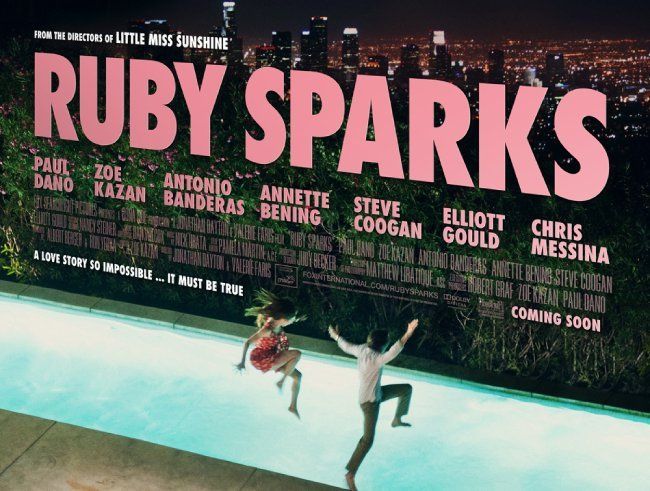Ruby Sparks
Boxing Ruby.

UK poster | Twentieth Century Fox
2012 — USA
A BONA FIDE production presented by FOX SEARCHLIGHT PICTURES.
Cast: PAUL DANO, ZOE KAZAN, ANTONIO BANDERAS, ANNETTE BENING, STEVE COOGAN, ELLIOTT GOULD and CHRIS MESSINA
Directors: JONATHAN DAYTON & VALERIE FARIS
Producers: ALBERT BERGER & RON YERXA
Executive producers: ROBERT GRAF, ZOE KAZAN & PAUL DANO
Screenplay by: ZOE KAZAN
Editor: PAMELA MARTIN
Cinematography: MATTHEW LIBATIQUE
Production Designer: JUDY BECKER
Art Director: ALEXANDER WEI
Costume Designer: NANCY STEINER
Music: NICK URATA
© Twentieth Century Fox Film Corp. / Dune Entertainment III LLC
Ruby Sparks is of note largely for being the second film by the directing duo behind sometime crowd-pleaser Little Miss Sunshine (2006), a film people seem to have largely turned on now, and the first film written by Zoe Kazan. In terms of the first film bit there, you can kind of tell.
You know, a bit of advice that for some reason particularly stuck with me from my dumb creative writing degree is that you should not make your lead character a writer. If they have to be an artist, make them like a painter or some shit; it helps obscure your self-indulgent ramblings about the creative process. Yeah, so this kind of pisses all over that. Obviously, writers as characters can work, even if I’m having trouble thinking of good examples typing this (Margot from The Royal Tenenbaums (2001), maybe?), but… this is one of those things where we’re told Paul Dano’s character wrote an amazing novel some ten years prior to the story, and he’ll apparently have written another by the time the credits roll. Informed abilities are terrible, but perhaps even worse is when you try and fail to make this ability ‘real’. We get several snippets of his writing, and it’s the most turgid shit imaginable. The first time it happens, I assumed it was intentionally bad, but, no, when he churns out his magnum opus in the denouement it’s the same sort of rubbish. “I’m no J.D. Salinger.” Yeah, you got that right, mate.
Elephant in the room: C.E. 2007, film critic Nathan Rabin coins the term ‘Manic Pixie Dream Girl’ to denote a certain archetype in cinema (and perhaps by extension TV, literature, etc.). This stock character he describes as “exist[ing] solely in the fevered imaginations of sensitive writer-directors to teach broodingly soulful young men to embrace life and its infinite mysteries and adventures”. As you might surmise from that, these characters are usually female and the target of their attentions are male. The typical version of said characters generally have some vaguely eccentric personality (though this was not actually specified in the original article) and apparently little interest beyond helping the aforementioned sad-sack dude discover the joie de vie, Because the internet ruins everything, this was soon corrupted and at some point people basically started using to refer to refer to any vaguely eccentric female character (Annie Hall’s eponymous character pops up on lists a lot, for example, despite her being her own person who wants different things to Woody Allen’s character being the whole bloody point) or, particularly worryingly, actual women (poor Zooey Deschanel is somehow labelled as such, despite, you know, being real). And 2014 Rabin distanced himself from the term. Kazan takes issue with the idea, or at least the idea in the form it morphed into, and this film acts somewhat as her treatise on it, which she describes as “reductive, diminutive and misogynistic”, although that it’s so was originally the point.
Indeed, the eponymous character here (played by Kazan herself) would not fit into the category, but the idea does permeate. The concept is the Dano’s awkward tortured genius (we know he is, because it keeps telling us) dreams her up and types up a story wherein they fall in love (on a typewriter, because of course he uses a typewriter in this contemporary set film) only for her to come to life and act according to his writings. Except of course she has no real life beyond him, he has neglected to supply her with one, and when she makes moves that suggest she develop into a ‘real’ person beyond him on her own, the temptation to write her into who he wants her to be proves too much, as the last act turns into a piece of existential horror that feels like it should be more fascinating than it is. Why? Because, good god, does this film pull its punches. In interview, Kazan stated that she wanted to explore these issues “in a way that wasn’t unkind or alienating to men”. The nature of the whole message means you probably shouldn’t alienate men as they’re frankly who it’s aimed at, but at the same time it really feels like it could and indeed should be meaner in how it goes about it. It never feels as disapproving of Dano’s character as it should be; somewhere along the line, that he is ultimately the villain of the piece got lost. He can be a sympathetic, understandable character, but the film seems to have trouble reconciling this with his beastliness and in properly confronting the increasingly awful stuff he does to the heroine. Perhaps I’ve read too much Angela Carter.
At time of writing, Ruby Sparks is available to rent on Youtube, amongst other streaming services. I recommend JustWatch for keeping up with where films are streaming (including this one!). Alternatively, physical copies are reportedly available for rent via Cinema Paradiso.
The film presently has a 15 rating (last being submitted in 2012), with the BBFC citing "strong language and soft drug use".



